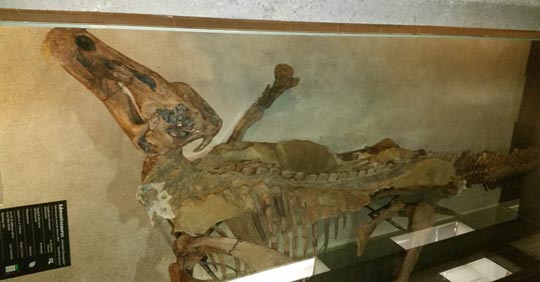Update on “Dakota” the recently found Hadrosaurine Mummy
“Dakota” Slowly but Surely Reveals Hadrosaur Secrets
Dakota, the nick-name given to the fossil hadrosaur mummy found in Late Maastrichtian (67 million years ago), sediments is slowly but surely being excavated out of the sandstone tomb that encases this amazing dinosaur fossil.
Fossil Hadrosaur
The process is extremely methodical, using tiny brushes and dental picks to remove the surrounding matrix revealing this beautifully preserved animal, complete with much of the skin left on the carcase, hence the mummified appearance of the fossil.
Members of the international team, responsible for this work, expect to spend many thousands of man hours meticulously removing the surrounding rock, often grain by grain as they bring Dakota back from the dead.
An Edmontosaurus
The large sandstone slabs that contain the fossil are now safely secured in the basement of the local museum, being stored and studied under controlled conditions. The dinosaur has been classified as an Edmontosaurus (a Late Cretaceous, hadrosaurine).
Speaking on behalf of his fellow researchers; Dr Phil Manning of the Manchester University said:
“This is the closest many people will ever get to seeing what large parts of a dinosaur actually looked like, in the flesh”.
“This is not the usual disjointed sentence or fragment of a word that the fossil records offer up as evidence of past life. This is a full chapter.”
Animal tissue usually decomposes or is scavenged quickly after death. Researchers say that this particular specimen must have been buried extremely rapidly and in just the right environment to permit the texture of the skin to be preserved.
An Example of a Fossil Hadrosaur Mummy (Edmontosaurus)

The Edmontosaurus exhibit at the Frankfurt Natural History Museum. Picture credit: Everything Dinosaur.
Picture credit: Everything Dinosaur
“The process of decay was overtaken by that of fossilisation, preserving many of the soft-tissue structures,” Dr Manning commentated.
Hadrosaur Mummy
For Tyler Lyson, the young palaeontology student who discovered the fossil, these are exciting times. Preserved skin is exceptionally rare in the fossil record and it is hoped that Dakota will shed new light on dinosaur appearance, skin structure and internal organ morphology.
The horse hair paint brush is typical of the tools used by palaeontologists to carefully remove the surround matrix, revealing the fossil impression of the hadrosaurine skin.
It is hoped that part of this amazing fossil will be able to put on display shortly at the North Dakota Heritage Centre. The team certainly have their work cut out, the fossil is effectively encased in two huge blocks of sandstone, the total weight of the specimen is approaching 5,000 KG, perhaps about as much as an adult Edmontosaurus would have weighed when they were alive.
To read more about the discovery of this fantastic fossil:
Dinosaur Mummy unlocks Duck-Billed Dinosaur Secrets.
“Dakota” was named after the U.S. state where the specimen was found.
Everything Dinosaur stocks a wide range of duck-billed dinosaur models including replicas of Edmontosaurus. To view the range of prehistoric animal models available: Dinosaur and Prehistoric Animal Models.

